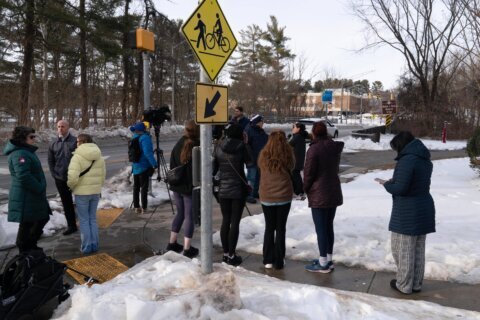Welcome to the School Zone, WTOP’s weekly feature about the latest topics and trends in education across the D.C. region.
Fairfax County School Board working to craft equity policy
What it is: Fairfax County Public Schools has started the process of crafting an equity policy, which school board officials said comes after years of cultural responsiveness and equity work.
Many D.C.-area school systems have introduced similar policies in the last few years.
Virginia’s largest school system, though, has never had a countywide equity policy.
Nardos King, the school district’s interim chief equity officer, said drafting the policy will help ensure the county cultivates a welcoming, inclusive and culturally-responsive environment.
King said a draft policy will be developed after community outreach initiatives, such as surveys and focus groups, and feedback from community members during the citizen participation portion of school board meetings.
The county’s equity policy is expected to include a statement of purpose, definitions of terms, goals aimed at ensuring equity and measurement and accountability.
A draft is expected to be presented to the school board during the 2022-23 school year.
What it means: King said Fairfax County has policies for other things it believes are important, pointing to the trust and family engagement policies. The trust policy, King said, makes clear that the county values immigrant families.
King said, for example, that conversations about school funding may require leaders to “think more deeply about how parking and activity fees are collected and distributed.”
School board member Karl Frisch said examples of “equity in action” include providing special education services, offering advanced academics and free and reduced meals.
Regional snapshot: Fairfax County officials highlighted the policies introduced in Arlington and Howard County, Maryland, as examples of those already in place.
Howard County, for one, approved its first equity policy in Oct. 2020. The county said in accordance with its policy, it has eliminated some prerequisite courses that had proven to exclude some student populations and removed lower level courses that may have resulted in delayed graduation for some high school students.
Howard County said it offers African American history courses at its 12 high schools too.
The Maryland Department of Education requires school systems to craft equity policies that get reviewed every three years.
In Arlington, Virginia, the school board approved the first equity policy in Aug. 2020. It includes explanations of workforce, governance and educational equity practices. All of the county’s policies are reviewed every five years.
Jason Ottley, Arlington’s chief diversity, equity and inclusion officer, told WTOP that while many people don’t memorize policies, they can help shape an organization’s culture.
Arlington’s policy is available online and is one, Ottley said, that principals may display in the front office.
Talking points: Ottley, in Arlington, said equity policies help bring accountability.
“A policy brings governance,” he said. ” … When you’re looking at a policy, it is the buy-in from the community, and also from the organization.”
Fairfax County School Board member Stella Pekarsky said it’s unfortunate that conversations about equity become “politically charged.”
“When you go out and you talk to people, including people that are extremely critical and come and rail against equity, (they) also tell you that they want kids to be successful. And you, us, all of us, should be doing everything we can to make sure that they are successful.”
Tips for helping kids cope with fear of needles
As the next school year approaches, health officials are urging parents to make sure their students are up to date on routine vaccinations.
I spoke to WTOP’s Kristi King for the latest.
Q: What are some of the reasons experts say kids may not be caught up on routine vaccines?
A: Some members of the medical community have hypothesized that skepticism over vaccine safety during the roll out of quickly-produced COVID-19 vaccines helped to inform, or misinform more accurately, and nurture anti-vax sentiments around routine childhood immunizations. That theory, however, is not supported by any polls or documentation I’m aware of.
We absolutely know you can blame the coronavirus.
Uncertainty about the safety of going into doctors’ offices during the pandemic and pandemic- related shutdowns pushed many family schedules and routines off track.
Q: What’s the best advice for parents whose kids are afraid or needles?
A: You’re in for long-term trouble if you try a quick fix by bribing, ambushing or tricking kids into getting shots. No way should you hold them down.
You need to be honest, offer options, and give kids distractions.
So, let them know what’s coming. Say it’s going to hurt, but only briefly — say they’re going to get a simple reward of something they like afterward. Empower the child by offering lots of choices about the process of getting the vaccine — which arm, who might they sit with and whether they want to be in a chair or on the exam table.
Distractions might include bringing along a favorite toy, or letting them watch a video on your phone or doing a singalong song.
And have you heard about the buzzy bee? It was news to me before doing this story. It’s a little device that looks like a plastic bee, it’s battery-operated and vibrates. You put it on the skin above the shot injection site and the vibrations confuse nerve cells from transporting pain messages to the brain. That’s the claim from the subject matter expert I talked with.
She also said pediatricians have lots of pain-relieving options now such as topical sprays and creams.
[Read more of Kristi’s reporting on WTOP.com]
By the numbers
Some data that caught my eye this week.
Student mental health: Members of the student adviser committee this week presented survey data regarding mental health as part of its annual report to the D.C. Board of Education.
The citywide survey included sections involving demographics, safe passage, mental health and COVID-19. It received 150 responses.
About 20% of respondents said they’d like to have a trusted adult at school. About half of respondents said they agree that they trusted their school to be transparent about the transmission of COVID-19 in school buildings.
“In terms of the actual transmission levels at school, that was very unclear,” student Gabriel Kramer said. “I personally got most of my information of that more from word-of-mouth than from the school. And when DCPS notified students, that was often pretty delayed from when you heard about an outbreak happening.”
More of the report’s findings are available online.
What Scott’s Reading
- DC-area colleges, universities come together to research ways to combat gun violence [WTOP]
- Fairfax County libraries modifying hours due to staffing [WTOP]
- Study: Student gains last year narrowed COVID learning gap [WTOP]
- Fairfax County School employees accused of stealing up to 35K laptops [NBC Washington]
- Fairfax County considers more speed devices after fatal Oakton crash [FFX Now]
- Four takeaways from school board races as ballot count continues [Bethesda Beat]
- Some students want colleges to provide the abortion pill. Schools are resisting. [NY Times]
Field Trip
Here’s a fun thought ahead of the weekend.
Easton excursion: We’re off to Easton for a wedding this weekend. The hotel had us do something we haven’t done in quite some time — pick up the phone to make a reservation! Online wasn’t an option.








